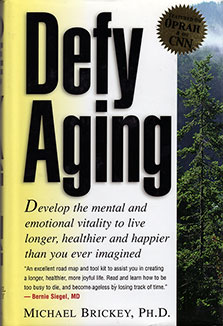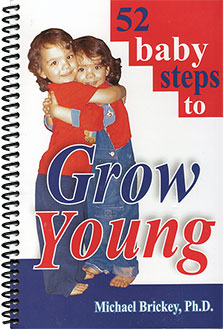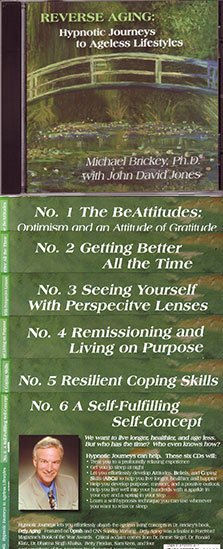The Defy Aging Newsletter
Anti-aging psychology, holistic health, and wellness
These are archives of a biweekly e-mail newsletter for helping you think, feel, look, and be more youthful and live with purpose.
Number 156
This issue:
Brain WiFi
ACTION TO TAKE
Adopt a belief that you gravitate to upbeat people.
WHY
Our brains have a built in WiFi (wireless fidelity system) to read and imitate others’ emotions in a matter of milliseconds. There is great adaptive value to quickly recognizing danger and reacting to it before the conscious mind even has time to figure things out. Our WiFi system also facilities rapport, shared emotions, and emotional bonding.
When you see someone scratch, yawn, or smile, your premotor muscles activate to do the same. What determines whether the movement it executed is beyond the scope of this article. What is clear from Daniel Goleman's research on Social Intelligence is that you are programmed to imitate other people. Two implications come to my mind for our goal of thinking, feeling, looking, and being happier.
#1 You become like the people you are around. If you are around dour, sour people, it drags your mood downwards. If you associate with upbeat people who smile a lot, you will smile more as well. I’m not suggesting you get a divorce because your spouse doesn’t smile enough. But it is worth considering whether the friends you choose, the activities you go to, and your workplace pulls you up or down. At the least, adopt a belief that you gravitate to upbeat people. You may want to consider whether you want to make some changes in how you spend your time or even whether your job could be structured differently or is ultimately a job you want to stay with.
It is interesting to theorize what can go wrong with emotional WiFi. Religious fanatics rigidly adhere to a belief system and pay little attention to WiFi input. Stereotypical lab scientists who do great research but are inept with people also have a WiFi system that pays little attention to input. Anti-social personalities may or may not read others well but ignore empathy. Dependent personalities too readily absorb and react to everyone else’s feelings.
#2 When one person is smiling and another frowning, which emotion is most contagious? One influence is power, i.e., people are more likely to mirror the bosses’ emotions than the boss it to mirror theirs. Power aside, it usually is the person with the strongest personality. By strongest personality I mean the person who has the clearest self-concept about who he or she is, especially emotionally, and stays with that default program most of the time. Thus a person who has a self-concept of being an upbeat, very resilient person who rarely gets pulled down is likely to be emotionally dominant with others. She is also likely to have what I would call an emotional immunity to others’ negative emotions.
Make a statement about your emotional self-concept. Does it give you the benefits I just described? If not, tweak it until it gives you the positive strong personality you love to have.
Quotes
Emotions will either serve or master, depending on who is in charge.
~Jim Rohn
You have more to do than you can possibly do. You just need to feel good about your choices.
~Time management/productivity guru David Allen
Humor
Mommy my feelings don’t feel good.
~Sonia Brickey at age 6 and not willing to settle for bad feelings
T-shirts from women who take crap from nobody:
~Guys have feelings too—but who cares
~Please don’t make me kill you
~I’m one of those bad things that happen to good people
Study Groups
I was delighted to learn that study groups in Los Angeles having been using Defy Aging and 52 baby steps to Grow Young for four years and are asking for more material. Meanwhile church groups are using 52 baby steps for study groups as well. If you are interested in either book for a study group or distribution at work, call 614-330-4126 for information on volume discounts or email MB@DrBrickey.com
Reprint this article from:
THE DEFY AGING NEWSLETTER
Anti-Aging Psychology
Holistic Health and Wellness
This newsletter article may be reprinted in E-zines, newsletters, newspapers, and magazines provided the content is not edited and the attribution below is given. Formatting may be changed and you may use one of the web site pictures of the author to accompany the article.
"Dr. Michael Brickey, The Anti-Aging Psychologist, teaches people to think, feel, look and be more youthful. He is an inspiring keynote speaker and Oprah-featured author. His works include: Defy Aging, 52 baby steps to Grow Young, and Reverse Aging (anti-aging hypnosis CDs). Visit www.NotAging.com for a free report on anti-aging secrets and a free newsletter with practical anti-aging tips."






